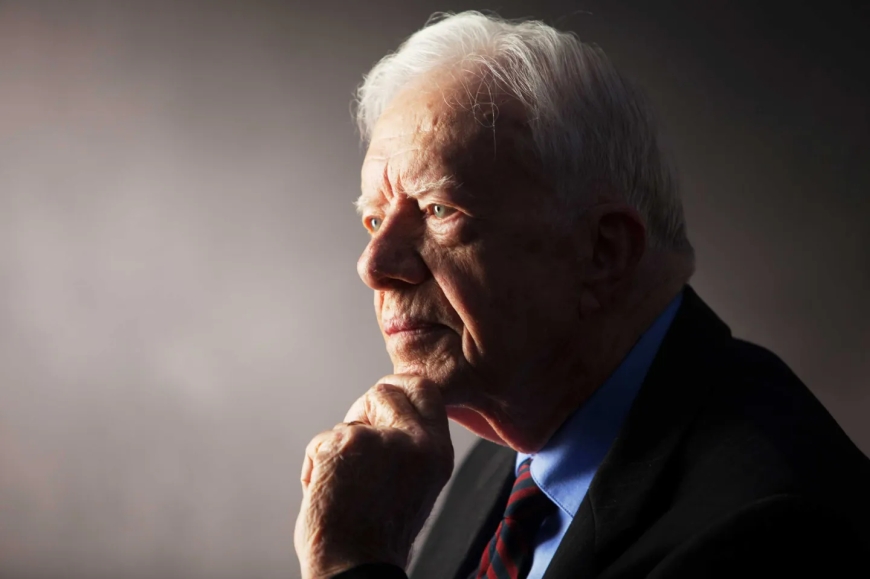Jimmy Carter’s Legacy: A Complex Mix of Political Failures and Humanitarian Triumphs
The passing of former President Jimmy Carter at the age of 100 marks the end of a long and eventful life. As the longest-lived U.S. president, his legacy is both celebrated and critiqued, reflecting a complex tenure in office and an unparalleled post-presidency. Carter’s presidency, though often viewed through a lens of disappointment and missed opportunities, serves as a poignant reminder of the disconnect between Western political ideals and the reality of governance.

The passing of former President Jimmy Carter at the age of 100 marks the end of a long and eventful life. As the longest-lived U.S. president, his legacy is both celebrated and critiqued, reflecting a complex tenure in office and an unparalleled post-presidency. Carter’s presidency, though often viewed through a lens of disappointment and missed opportunities, serves as a poignant reminder of the disconnect between Western political ideals and the reality of governance.
Carter’s rise to the presidency in 1976 was marked by optimism, a promise of reform, and a new vision for America’s future. Yet, his tenure unfolded against a backdrop of economic turmoil and social unrest. He inherited an economy crippled by inflation, a stagnant job market, and an energy crisis that only worsened as his term wore on. Despite his lofty campaign promises, Carter’s inability to navigate these challenges effectively — coupled with an often fraught relationship with Congress — doomed his ambitious domestic agenda.
Where Carter found some success was in his foreign policy, especially in the Middle East. The crisis, compounded by the Soviet invasion of Afghanistan and Carter’s inability to respond effectively, tarnished his presidency.
Critics often point to his inability to advance meaningful domestic reforms, particularly in health care and employment. Though Carter initially supported progressive policies like universal health care and guaranteed jobs, he quickly retreated from these positions, opting instead for fiscal conservatism and deregulation. His failure to implement bold reforms not only left much of his progressive base disillusioned but also laid the groundwork for the rise of Reagan-era conservatism.
However, it is in his post-presidency that Carter truly carved out a unique and enduring legacy. Abandoning the political arena, he focused on philanthropy and global humanitarian efforts. The Carter Center, founded in 1982, became a beacon for efforts in disease eradication, election monitoring, and peace-building. His work with Habitat for Humanity and his campaigns to combat diseases like guinea worm made him a respected figure internationally. The Nobel Peace Prize he received in 2002 was a testament to his long-standing commitment to human rights and peace, especially during a time when U.S. foreign policy was increasingly dominated by the aggressive policies of the Bush administration.
Yet, Carter’s post-presidential career was not without controversy. His outspoken criticism of the U.S. stance on Palestine and his book Palestine: Peace Not Apartheid made him a polarizing figure in American political circles. At a time when U.S. foreign policy was deeply entangled in the Middle East, Carter’s pro-Palestinian views challenged the status quo, earning him both admiration and scorn. His stance served as a reminder of how difficult it is to maintain a moral compass in the face of geopolitical pressures, particularly in a world where Western political interests often overshadow human rights.
Carter’s presidency, then, is a paradox. His idealism clashed with the realities of governing, leaving a legacy marked by unmet potential and political frustration. Yet, his post-presidency illuminated a different path — one defined by compassion, service, and a commitment to the values that he had often struggled to enact during his time in office. Carter’s life is a stark reminder of the contradictions inherent in American politics: the chasm between lofty ideals and the brutal pragmatism of political power.
While many see Carter as a failure in terms of domestic policy and international diplomacy, his post-presidency offers a lesson on the power of redemption and the importance of remaining committed to one’s principles, even after the political spotlight fades. His humanitarian efforts, often in direct opposition to the policies of successive U.S. administrations, stand as a reminder that true leadership is not always about political victories but about the courage to act in accordance with one’s beliefs.
As we reflect on Carter’s life and legacy, it’s crucial to consider the broader implications of his presidency. In many ways, Carter’s failures were emblematic of the limitations of Western political ideals — especially the belief in American exceptionalism and the notion that the U.S. can impose its will on the world. Carter’s presidency showed us that idealism must be tempered with pragmatism and that moral leadership often comes with significant costs. His post-presidency, however, reminded us of the importance of acting on those ideals, even when the political system seems unwilling or unable to support them.













































